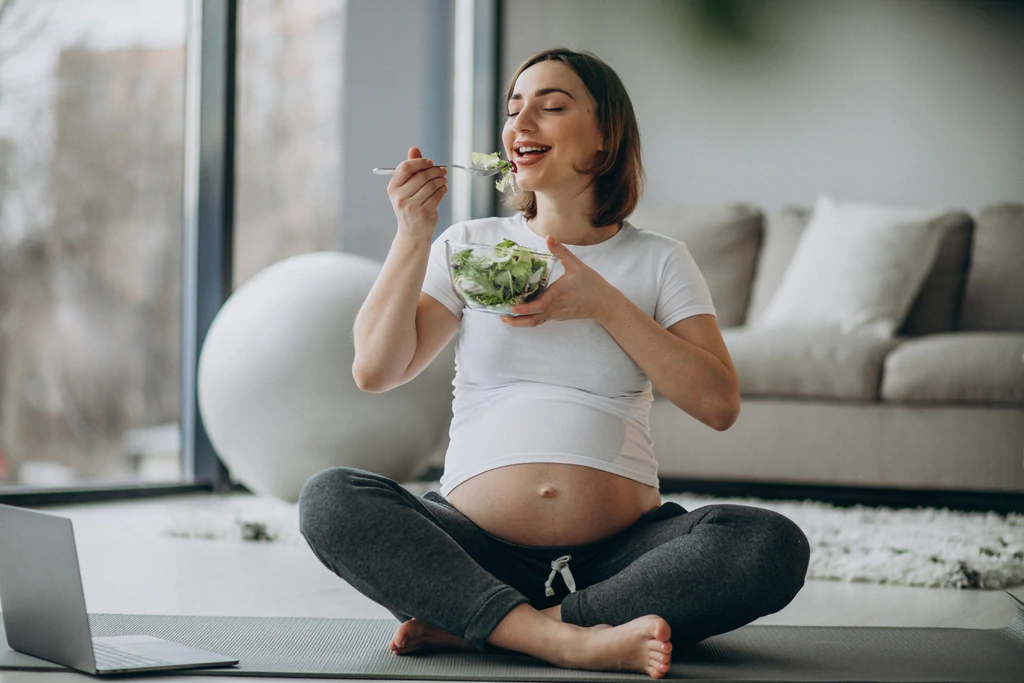We all know to eat a balanced diet with plenty of fruits, vegetables, protein, and healthy fats.
However, it’s especially important for women who are looking to get pregnant to eat a fertility-friendly diet. Here are some great prepregnancy foods and nutrients to load up on when you’re trying to conceive.
Berries
Antioxidant-rich fruits that are loaded with vitamin C, such as blueberries, raspberries, and strawberries, can help to boost fertility by counteracting unstable molecules in the body (called free radicals) that could otherwise be harmful to egg cells and sperm.
Along with pomegranates, these antioxidant-loaded fruits are great fertility foods for both women and men.
Fertility diet meal idea: Make yourself a fruit berry salad by squeezing some honey and lime juice over a couple handfuls of blueberries, strawberries, and raspberries.
Milk, yogurt, cheese
Calcium creates healthy bones and teeth, and you need at least 1,000 milligrams of it daily to keep your organs and muscles working properly. Men should also pay attention to their calcium intake as studies have shown that calcium deficiency can be linked to male infertility.
When putting together a prepregnancy diet plan, it’s helpful to keep in mind that dairy products such as milk, yogurt, and cheese are the best absorbed sources of calcium.
Milk is arguably the most popular source of calcium, supplying about one third of the daily recommended intake in just one cup of 1 percent milk. Yogurt and cheese are equally effective at strengthening your bones.
If you want to take it one step further and ramp up your chances of conception, you can try replacing low-fat dairy foods with their high-fat equivalents.
A 2007 study found that women who consumed one or more daily servings of high-fat dairy foods were 27% less likely to be infertile, and those whose fertility diets had more low-fat dairy products had more trouble getting pregnant.
Fertility diet meal idea: A perfect way to sneak some fertility-friendly foods into your prepregnancy diet is to top a few scoops of full-fat yogurt or fortified cereal with granola, bananas, and antioxidant-packed berries.
Dark leafy greens
A proper fertility diet for women would not be complete without folate and folic acid.
The two terms are often used interchangeably, but it’s helpful to know that folate is the natural form of vitamin B9 found in food, while folic acid is the synthetic form used in processed foods and supplements.
It’s well known that folate is an essential vitamin for pregnant women.
Not getting enough folate during pregnancy could result in problems affecting the baby’s brain, spine, and other birth defects. However, it’s just as important to get these vitamins when you’re trying to conceive.
Dark leafy vegetables provide tons of folate. In fact, some foods with the highest folate levels include spinach, kale, asparagus, and brussels sprouts.
If you find it difficult to reach the daily recommended amount (at least 400 micrograms of dietary folate equivalents) through natural food sources alone, try supplementing your diet with foods fortified with folic acid, such as fortified breakfast cereals, rice, and pasta.
Fertility diet meal idea: If you’re feeling adventurous, try whipping up a healthy smoothie by blending a variety of dark leafy vegetables like kale and spinach, berries, and full-fat yogurt.
Beans, peas, lentils, nuts, seeds
A fertility diet for women looking to get pregnant should also include protein.
One way to achieve your prepregnancy protein goals is to load up on plant-based proteins and stack your plate with legumes (beans, lentils, and chickpeas), nuts (almonds, peanut butter, and walnuts), and seeds (pumpkin, sunflower).
Not only are these a great source of protein, but they also provide plenty of folate, iron, and fiber.
Although you can get protein by consuming meat, researchers discovered in a study that when 5% of your total calories come from vegetable sources of protein rather than animal-based protein, you can reduce your risk of ovulatory infertility by 50%.
Therefore, swapping animal protein such as chicken and red meats with plant-based protein could be a smart choice for women looking to conceive.
These researchers also found that women who ate more protein (115 grams/day) were 41% more likely to have reported problems with ovulatory infertility than those who ate less protein (77 grams/day).
So while protein is an important part of your fertility diet, be careful not to overdo it.
Fertility diet meal idea: If you want to step up your prepregnancy diet game, challenge yourself to making a hummus dip featuring chickpeas as the base and scoop freely with celery and carrot sticks.
Fatty fish
Fatty fish is a great source of omega-3 fatty acids that help to regulate ovulation hormones and increase blood flow to your reproductive organs.
If you’re wondering which fatty fish are best to eat when trying to get pregnant, salmon, sardines, anchovies, and herring are all great options.
Not only do these fish have high vitamin D and protein content, they are also lower in mercury levels compared to other fish.
In general, choose wild salmon over farm-raised salmon (the latter contains significantly higher levels of contaminants) and stay away from shark, swordfish, king mackerel, and tilefish as they contain high levels of mercury.
Fertility diet meal idea: A simple dish that you can add to your prepregnancy diet plan is baked wild salmon and asparagus spears garnished with lemon wedges for an extra dash of vitamin C.
Following a fertility-friendly diet will give you a big boost toward reaching your pregnancy goals, but you might not get there through food choices alone.
Let Eveline support you on your pregnancy journey! The Eveline digital OPK is a handy tool which tracks your ovulation status and sends you notifications on the days you’re most fertile so that you always know the best days to conceive.
——
This article is for informational purposes only and is not meant to offer medical advice.
——
Image by senivpetro




